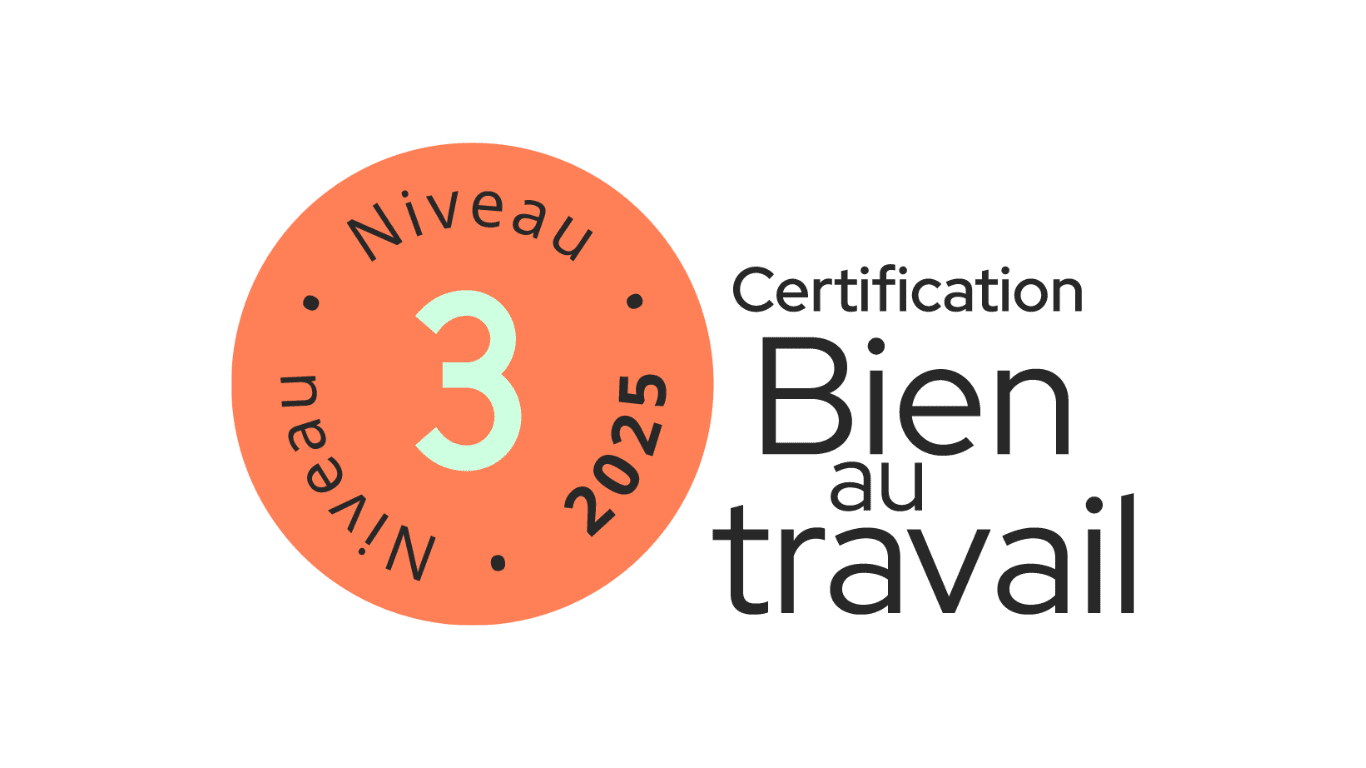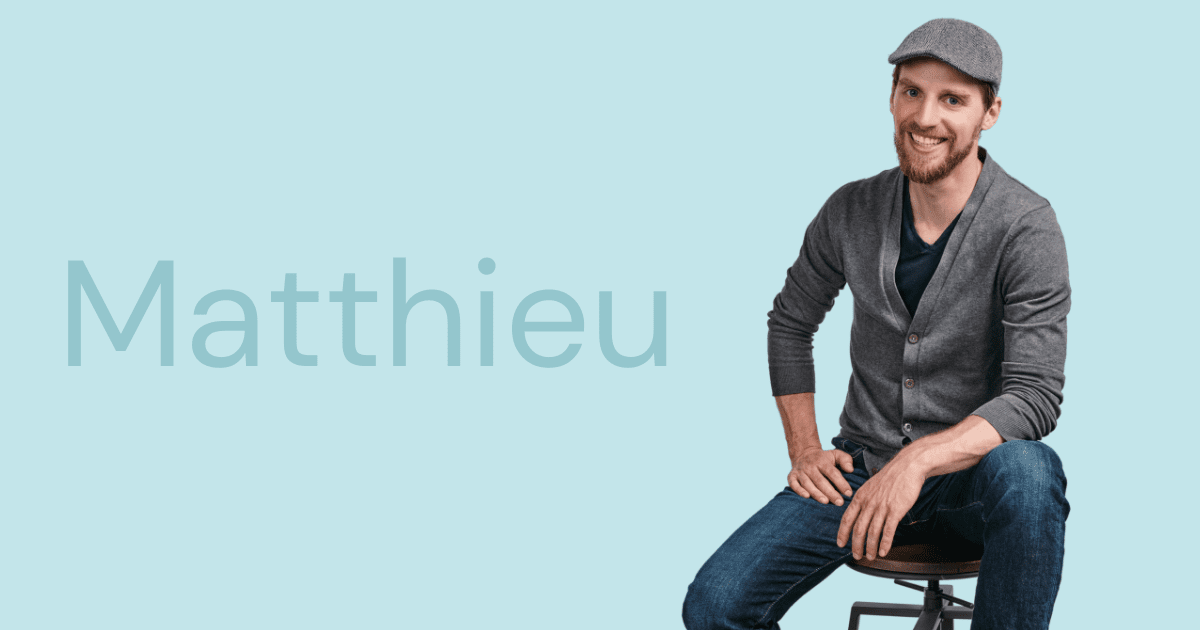
8 April 2025
5 min.
At Boostalab
14 January 2022
9 min.

Each month, we introduce you to a Boostalab team member or collaborator. This time, we’re introducing Matthieu, our learning experiences facilitator. He is also our IT wizard, a young father of two, and a linguistics enthusiast.
My name is Matthieu Bister. I love encouraging people to do some introspection. For example, right now, I might ask you: remember a time when you learned something, in your life or in your work.
That’s what I do: I create moments and materials to make it easier for people who want to learn to become aware. I’m primarily a generalist: I dabble in a little bit of everything, so Boostalab‘s entrepreneurial operation allows me to have fun doing different things.
In addition to work, I am a father of young children, so I focus on my little family life. Parenthood is quite a challenge! You always have to be working on yourself and learning new things. It’s a chance for me to walk the talk: I have no choice but to see it as a great learning experience! I love it, even if it’s not easy… like any learning process.
I’m also active in community theater, mostly at the governance level these days, but in the past, I’ve done a lot of shows in production or technical roles.
Self-directed teams very much appeal to me and I was very curious to see what it was like from the inside. Then, the role of facilitator of learning experiences and designer is a position that I both master and love. Also, I was looking for a team, a movement bigger than myself to really leverage my strengths. As a strong proponent of collective intelligence, it was time for me to be part of a team after years of self-employment! It required some adjustments to my work habits, but I don’t regret it at all; I have way too much fun in what I do every day!
On a typical day, I’ll work on preparing at least one workshop for a client mandate, or maybe a webinar. This could be the slides we use, the participant workbook, or the logistics behind interactive exercises on Zoom. Lately, I’ve also been busy leading the development of a new ready-to-train kit, on one of my favorite topics: coaching! I can’t wait to share it with our community.
I also often work on internal projects, such as our learning strategy, the development of our Teamtonic platform, etc. I like to instill a sense of accomplishment in the team! A colleague recently pointed out that I am apparently a little engine that drives a lot of practical things for the team, I really appreciated that feedback.
My favorite moments are when I witness a learning moment or a breakthrough during a workshop, no matter how small, for one of the participants. And I love sharing those moments with the whole team afterwards!
Growth: I am *always* asking myself how to grow as a person, whether in my human skills or in my life philosophy. One idea that inspired me is the notion proposed by Ken Wilber: when you grow as a person, you transcend and include the past stages of your own development*. Basically, Celine Dion is wrong when she says that we don’t change; yes, we can change. But she is also right at the same time: we build on who we already are. When I develop skills, I expand my toolbox, and that alone motivates me to push myself. Because when I expand my toolbox, I access more different ways of seeing and feeling the world, and I find that really richer as a life experience!
*Note that Wilber’s AQAL theory is not foolproof. It does, however, offer some very practical glasses for talking about surpassing oneself. Interesting fact: it is from this theory that Frédéric Laloux developed the “Opale” model of reinvented organizations!
My first superpower is abstraction. The art of conceptualizing complex things to make connections. It enables me to find metaphors and thus to help make seemingly intangible ideas more accessible. This is one of the things, I think, that makes me a generalist: I derive a lot of energy from diving into a new subject or field and trying to understand its ins and outs. And since it’s pretty natural for me to make connections or parallels between things, I feel like it helps me interact with a variety of people without any issues!
But I would also like to mention inclusion as a superpower. Indeed, in a group, I always make sure that everyone has the chance to take part in a discussion. To the point where being in a horizontal team is a bit of a challenge for me, as I always have to question my inclusion reflex and determine which issues I should or should not consult my colleagues on.
Do you know how to fully exploit your superpowers?
Rock climbing, but especially cycling. I have been a functional sportsperson: the bicycle was my main means of transportation for about ten years. I never hesitate to try a new sport or to practice it when the opportunity arises, but with being a young parent, I don’t create the opportunities myself anymore (except in exceptional cases). I hope to get back into climbing when the kids are a little older.
My favorite is the unicycle, for the sense of freedom provided by the continuous balancing motion. It’s like flying for a few moments, I haven’t found that anywhere else.
Discuss, discuss and discuss some more! It is through dialogue that I grow the most: I expose my hypotheses of how things work, and then I receive different viewpoints and this helps them evolve. Also, when I articulate my findings to someone else, it makes them more “real”, I integrate them better into how I see the world.
And give myself the right to not be excellent the first time. That, however, is difficult for me!
The end of my master’s project: I concluded a series of 8 meetings with my client with an activity that was a little more original than usual. It unlocked some great things in the group. I realized that I had only taken a risk at the end of the project by offering a fun activity, because I was too careful to project a “professional” (i.e. serious) image before that. My desire to look good held back the full expression of the participants as the project progressed; this is a lesson I will not soon forget.
As a teenager, I was hesitating between a career in engineering… and becoming a priest! In addition to the great philosophical and spiritual questions that fascinate me, I wanted above all to guide individuals and communities in their inner journey to become better human beings. Even though I began my career by studying engineering, it is finally these objectives that I am achieving today! Well, let’s say in a different lifestyle…
You can easily follow me on LinkedIn. I’m there and I regularly share things that inspire me.